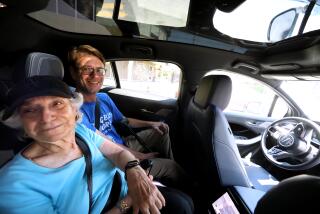Honda Chief Declined to Meet With Safety Group
- Share via
Tetsuo Chino, chairman of American Honda Motor Co., testified Thursday that he rejected two requests from the U.S. Consumer Products Safety Commission to meet with him when the safety agency was investigating thousands of injuries and deaths related to the company’s all-terrain vehicles.
Testifying on the third day of a personal injury lawsuit filed by the parents of a 14-year-old boy who suffered brain injuries when he fell from a Honda-built ATV, Chino admitted that he turned aside commission requests in December, 1984, and June, 1985, to meet with officials from the safety board. A 1985 letter from the commission threatened to sue the Gardena-based company if its ATVs were found to be hazardous.
“I do recall hearing that,” Chino said when questioned about the letter by San Diego attorney Craig McClellan. McClellan is representing Frank Cusimano Jr., who was severely injured five years ago when he fell off a Honda ATC 110 three-wheeled vehicle that was being driven by an 8-year-old friend. The suit seeks unspecified damages.
The letter also urged Chino to meet with the group at his earliest convenience, “but not later than June 21, 1985,” to discuss voluntary safety standards for the three-wheeled vehicles.
Chino said he responded to the requests for meetings by sending Honda technicians instead to meet with the commission.
“I understood that the CPSC was interested in knowing the product design and development. Therefore, I sent the most appropriate person in that area. The technical division . . . was the most appropriate division,” Chino said.
In addition to heading Honda’s operations in the United States, Chino is also the senior managing director of the Honda Motor Co. in Japan.
Claiming Unfair Questioning
Most of Chino’s testimony Thursday was given with the assistance of an interpreter, unlike Tuesday and Wednesday, when he used the interpreter occasionally. McClellan’s relentless questioning of Chino drew a protest from Honda’s attorney, Richard Bowman, who has complained frequently during Chino’s three days on the stand that McClellan’s questions are either unfair or argumentative.
“I think we have a filibuster and I don’t like it,” Bowman said to Superior Court Judge Ben Hamrick while the jury took a break in the hallway. Hamrick brushed aside the protest and said that McClellan had indicated that he only had a few more questions to ask Chino.
Before the jury began hearing testimony on Thursday, Hamrick ordered the attorneys for both sides not to discuss the case with the press. Hamrick said that he issued the gag order out of concern for the publicity given to the case and because Bowman and McClellan both complained that the other had been talking too much to reporters about the case.
On Wednesday, Bowman, who has been inaccessible to reporters, charged McClellan with “trying this case on the street corner,” and complained about McClellan talking with reporters in the courtroom. Bowman also said that he did not want Chino’s picture taken by photographers, but Hamrick allowed a television cameraman and still photographer in the courtroom anyway.
Earlier this year, McClellan won a $36-million settlement from Honda on behalf of a 15-year-old Escondido girl who was left a quadriplegic when she was thrown off a Honda ATV in 1982.
‘Too Little, Too Late’
On Thursday, Chino acknowledged that an industry lobbying group in Washington, which he helped create, warned him and other ATV manufacturers in August, 1986, that industry attempts to establish voluntary standards were not sufficient.
“Recent activity in voluntary standards might be subject to criticism for having (been) too little, too late,” said a memo from the group, the Specialty Vehicle Institute of America, that was presented in court. The group’s staff urged its board of trustees, which includes a Honda representative, to do something “dramatically” to help reduce ATV accidents and injuries.
Chino said that Honda responded to the group’s recommendations by instituting a company safety program. In an attempt to promote safety, Honda purchased 10 acres in Riverside that it will turn into a training center to teach safe ATV riding, Chino said. If that program is successful, Honda plans to open as many as 100 training centers in the United States, he added.
While the ATV lobby group was urging its board of directors to establish programs to reduce accidents and injuries resulting from ATV riding, the organization also was lobbying to prevent states from passing laws that “restrict the age of ATV users.”
Currently, no age restrictions are placed on people who ride ATVs. Chino said that “Honda does not think that age alone is a determining factor in safety.”
McClellan quoted from memos sent by the specialty vehicle group to Chino and other executives in which lobbying activities were discussed, including blocking government proposals that would require Honda and other ATV manufacturers to offer a free riding helmet with each ATV sold.
McClellan tried repeatedly to get Chino to comment on whether he approved of the industry lobby group’s efforts to block passage of laws that would impose an age limit on ATV riders. Chino never answered the question directly and instead said that “the purpose of lobbying . . . is to provide proper and correct information.”
Honda has repeatedly denied that the ATVs it manufactures are defective and has rejected charges by the safety commission and other consumer groups that the vehicles are unstable. Chino has blamed all ATV-related injuries and deaths on “driver misuse.”
“I was never informed (by Honda engineers) that instability of the vehicles caused accidents,” he said.






